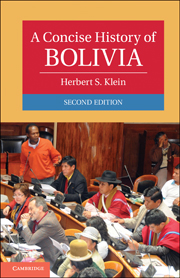Book contents
- Frontmatter
- Contents
- Preface to the Second Edition
- Preface to the First Edition
- 1 GEOGRAPHY AND PRE-COLUMBIAN CIVILIZATION
- 2 THE CREATION OF A COLONIAL SOCIETY
- 3 LATE COLONIAL SOCIETY: CRISIS AND GROWTH
- 4 REVOLUTION AND THE CREATION OF A NATION-STATE, 1809–1841
- 5 THE CRISIS OF THE STATE, 1841–1880
- 6 THE AGES OF SILVER AND TIN, 1880–1932
- 7 DISINTEGRATION OF THE ESTABLISHED ORDER, 1932–1952
- 8 FROM THE NATIONAL REVOLUTION TO THE COLD WAR, 1952–1982
- 9 CREATING A MULTIETHNIC DEMOCRACY, 1982–2002
- 10 THE EMERGENCE OF A MESTIZO AND INDIGENOUS ELITE, 2002–2010
- Political Chronology
- Tables
- Bibliography
- Index
- Titles in the series
4 - REVOLUTION AND THE CREATION OF A NATION-STATE, 1809–1841
Published online by Cambridge University Press: 01 June 2011
- Frontmatter
- Contents
- Preface to the Second Edition
- Preface to the First Edition
- 1 GEOGRAPHY AND PRE-COLUMBIAN CIVILIZATION
- 2 THE CREATION OF A COLONIAL SOCIETY
- 3 LATE COLONIAL SOCIETY: CRISIS AND GROWTH
- 4 REVOLUTION AND THE CREATION OF A NATION-STATE, 1809–1841
- 5 THE CRISIS OF THE STATE, 1841–1880
- 6 THE AGES OF SILVER AND TIN, 1880–1932
- 7 DISINTEGRATION OF THE ESTABLISHED ORDER, 1932–1952
- 8 FROM THE NATIONAL REVOLUTION TO THE COLD WAR, 1952–1982
- 9 CREATING A MULTIETHNIC DEMOCRACY, 1982–2002
- 10 THE EMERGENCE OF A MESTIZO AND INDIGENOUS ELITE, 2002–2010
- Political Chronology
- Tables
- Bibliography
- Index
- Titles in the series
Summary
The nineteenth century in Upper Peru began with a severe long-term depression that had a profound effect on its literate urban populations and its mining export economy. This decline and the serious agricultural crises that erupted in the countryside formed a crucial background to the region's response to the collapse of the imperial government in Madrid. In late 1806 and all of 1807, Napoleon's armies slowly invaded Spain and eventually forced the abdication of the Bourbon monarchy. In May 1808, the Madrid populace rose up in revolt against the new French-controlled Spanish government, and the rebels eventually established a formal resistance structure that proclaimed itself to be the legitimate government of the Bourbons. Known as the Junta Central, and controlling part of southern Spain, the rebel regime claimed legitimacy, despite the abdication of Ferdinand VII, and demanded loyalty from the colonial viceroyalties. Such a situation of divided government had occurred once before in imperial history at the very beginning of the eighteenth century, when the Bourbons and Hapsburgs had contended for control over Spain and fought a long and bitter conflict for the monarchy on Spanish soil. But at that time the colonies were passive and allowed all basic decisions about the fate of Spain and the empire to be made in Europe.
- Type
- Chapter
- Information
- A Concise History of Bolivia , pp. 89 - 117Publisher: Cambridge University PressPrint publication year: 2011

